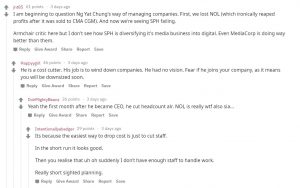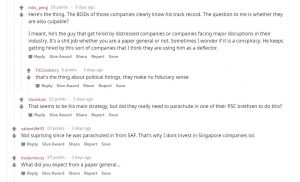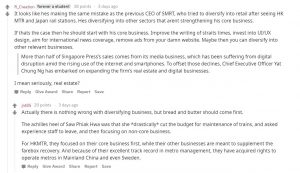International publication Bloomberg has called Singapore Press Holdings (SPH) “the worst performer on the MSCI Singapore Index,” with shares now hovering at a quarter-century low.
SPH is Singapore’s largest media group and publishes mainstream newspapers such as The Straits Times, Lianhe Zaobao and Berita Harian. SPH was once bigger than the New York Times Co. in terms of market capitalisation but the group has lost nearly half, or S$3.2 billion, of its market value and has shrunk in value since the end of 2014.
This year, SPH dropped by 4.7 per cent, compared to the 11 per cent gain in the 25-member MSCI Singapore Index. The group’s shares have also dropped to their lowest in 25 years.
In April 2018, SPH reported that its net profit for the quarter that ended in February fell by a hefty 25.7 per cent. In July, SPH reported that its third-quarter profits have crashed by a hefty 44.1 per cent, from S$46.91 million in the third quarter last year to S$26.2 million this year.
Bloomberg data shows that SPH’s net income is “set for a seventh annual decline in eight” while shares are “set for a fifth yearly decline”.
SPH’s media business’ profit before tax plunged by 32 per cent to S$52.1 million as media sales for the nine-month period that ended in 31 May fell by 12 per cent to S$439.7 million from a year ago.
Over half of SPH’s sales come from its media business, which has been struggling due to digital disruption. To combat this, SPH CEO Ng Yat Chung focused on expanding SPH’s real estate and digital businesses.
While SPH’s revenue from property rose by 21 per cent, Bloomberg said that the company’s strategy of diversifying into real estate “has so far failed to offset sagging earnings from its media business.”
Citing analysts who reportedly remain unimpressed with SPH’s attempts to diversify, Bloomberg quoted RHB securities’ analyst Jarick Seet who said that SPH’s expansion into property is helping its performance but “other segments are not able to replace the drop in earnings” in the group’s core media business, which is “deteriorating at a much faster pace.”
SPH declined to comment on its performance when it was approached by Bloomberg.
In a statement released last month after SPH reported its third quarter results, CEO Ng said: “The media business continues to be challenged on various fronts including the ongoing trade tensions and the slowing of the Singapore economy, but we remain focused on our digital transformation strategy.”
The considerable decline in SPH’s net profit in recent quarters is not an anomaly. In April last year, SPH suffered a 25 per cent decline in net profit for the second quarter, as compared to the same period in 2017.
The decline SPH saw in net profit, advertisement and circulation revenue came as the group was in the middle of a massive job cut exercise, retrenching employees and relocating staff to new newsdesks as it sought to cut hundreds of jobs. Several employees at SPH Magazines were also sacked to reportedly prepare for a “digitally driven future”.
These efforts do not seem to have paid off. Interestingly, SPH’s steady decline in net profit has been ongoing since 2017 – the year ex-Chief of Defence Force Ng Yat Chung took over as Chief Executive Officer.
Netizens responding to SPH’s sinking performance raised questions on Mr Ng’s management style and whether SPH will go the same way as Neptune Orient Lines (NOL) – the last organisation that Mr Ng led.
Mr Ng was formerly the CEO of NOL. Under his charge, NOL lost more than $1.5 billion and finally, to stop the hemorrhaging, Singapore sovereign wealth fund Temasek was forced to sell NOL away to the French group CMA CGM. -/TISG















